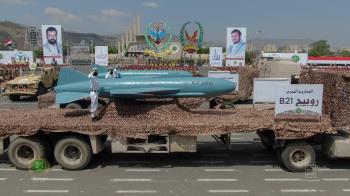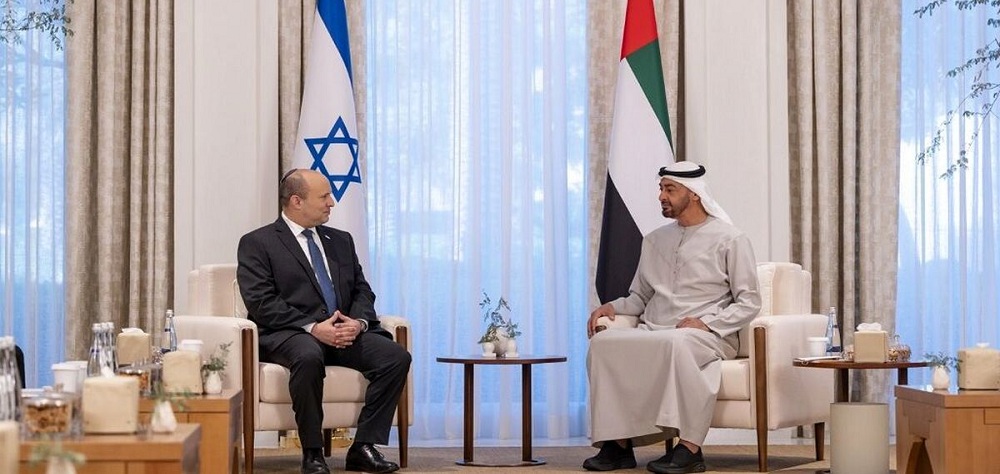Alwaght- Israeli Prime Minister Neftali Bennet flew to the UAE on Monday in the first visit of an Israeli PM to the Arab monarchy in the Israeli seven-decade life. The visit marked a long step to expansion of Tel Aviv relations with the Persian Gulf Arab states.
The event takes place 15 months after signing a normalization deal with Abu Dhabi. Previous Israeli PM Benjamin Netanyahu inked the accord with the Emirates. He several times voiced readiness to pay the UAE a visit but each time this did not take place. The very delay of the trip is expressive of various issues that increase its sensitivity.
Economic cooperation tops the agenda
Since the signing of the thaw agreement last year, the Emirati and Israeli officials have signed a series of agreements and documents expanding cooperation in various sectors. Meanwhile, the UAE is trying to take the most economic advantage of the limited political relations between the Israeli regime and the Arab world, especially in the Persian Gulf, by taking the lead in normalization.
Actually, although the Israelis mainly eye political goals such as regional de-isolation and movement towards regional coalitions to reduce the burden of their security problems in the face the Axis of Resistance— a powerful bloc of Iran, Syria, Iraq, Lebanon, and Yemen— as well as legitimize historic anti-Palestinian violations as the most important achievements of normalization, the UAE tends to follow the economic aspect of the peace deal with the Israeli government. Amid Saudi concerns and a state of indecision about the normalization, Abu Dhabi sees the opportunity ripe to harvest what it sees economic advantages of the ties with Tel Aviv. It is also unignorable that the Emirati rulers expect whitewashing their black human rights records and political dictatorship in the eyes of the West as an achievement of normalization.
However, the economic attitude of the UAE leaders has led Tel Aviv to include economic issues in the focus of Bennett's visit to the UAE in order to sweeten the deal and encourage other Persian Gulf monarchies to follow suit. According to the UAE state news agency, the Israeli PM and Abu Dhabi Crown Mohammed bin Zayed met to discuss "bilateral cooperation" in "agriculture, food security, renewable energy, advanced technology, health, and other vital sectors."
Cyber security, health, education, and aviation are four sectors where Tel Aviv and Abu Dhabi have been prolific and massively investing, the news agency cited Bennett as saying.
The UAE and worry about security friction
To the Emirati leaders, trying to get closer to the Israeli regime has always been like moving on a slippery surface, carrying with it the risk of troubles. The angry look and security concerns of the powerful northern neighbor, Iran, is not something that can be easily absorbed or ignored by the leaders of Abu Dhabi. Tehran has repeatedly stated and demonstrated in practice that it will not hesitate defending its security interests in the Persian Gulf. The seizure of a British tanker, shooting the US's state-of-the-art drone Global Hawk, and the continuation of naval confrontations with the American forces in the Persian Gulf in recent months prove the firmness of the political stance of the Iranians. Therefore, the UAE is unavoidably walking a tightrope between Iran and the Israeli regime in its current foreign policy. It opens the doors of cooperation with Tel Aviv while keeping the conditions with Tehran calm and far from frictions.
Last week, a senior Emirati diplomat traveled to Tehran, meeting with new Iranian President Sayed Ibrahim Raisi and others in first such visit of an Emirati official in five years. The timing of the visit to Tehran of National Security Adviser Sheikh Tahnoun bin Zayed Al Nahyan before the Israeli PM visit had a balance-making nature.
By its senior official's visit, the UAE wanted to tell Tehran it is not interested in entering anti-Iranian alliances behind bolstering ties with the Israelis. But Tel Aviv-Abu Dhabi closeness definitely deals a blow to neighborly relations and works as a distrustful factor in bilateral ties with Iran, just like the joint Saudi-Emirati war waged against Yemen. By taking this policy path, the Emirates would have to constantly disengage itself from fallouts of the destabilizing Israeli actions in the region.



























